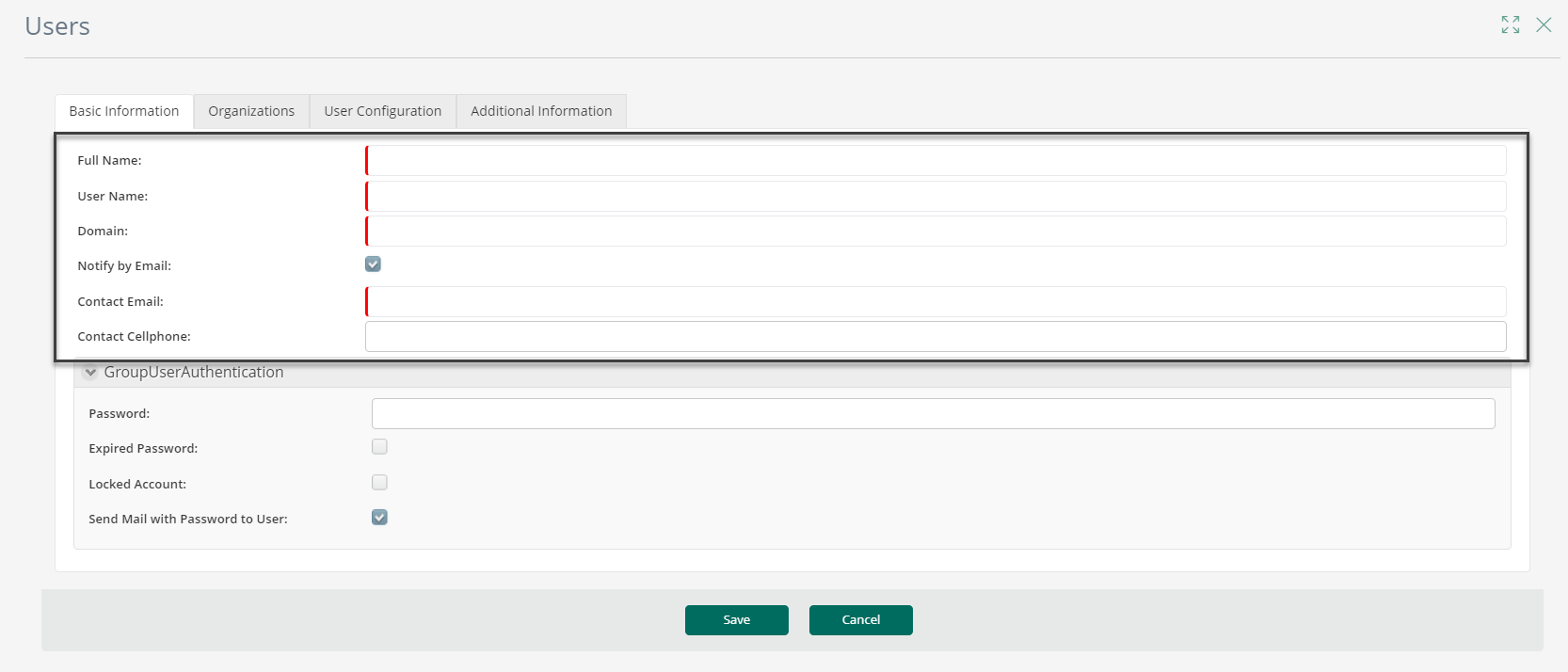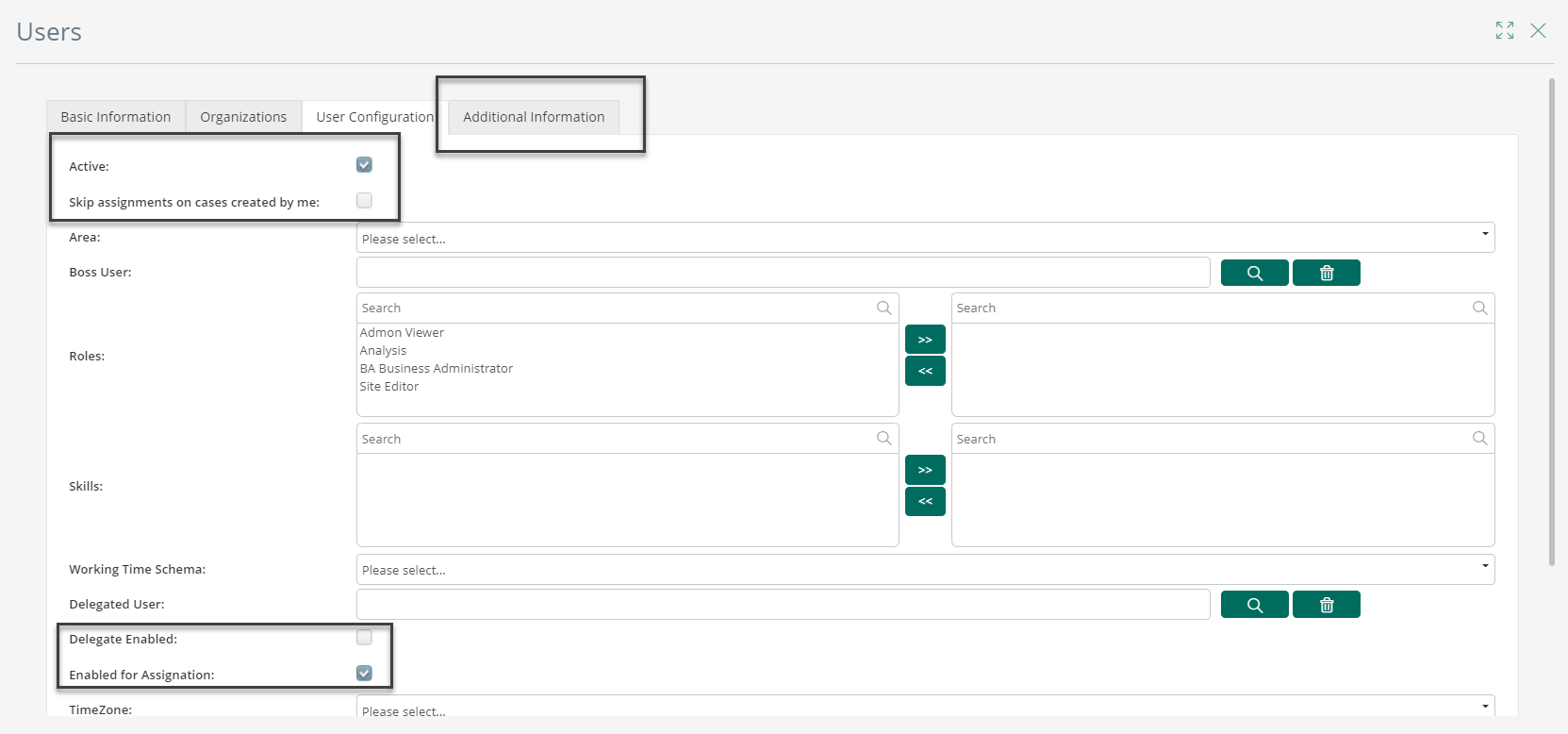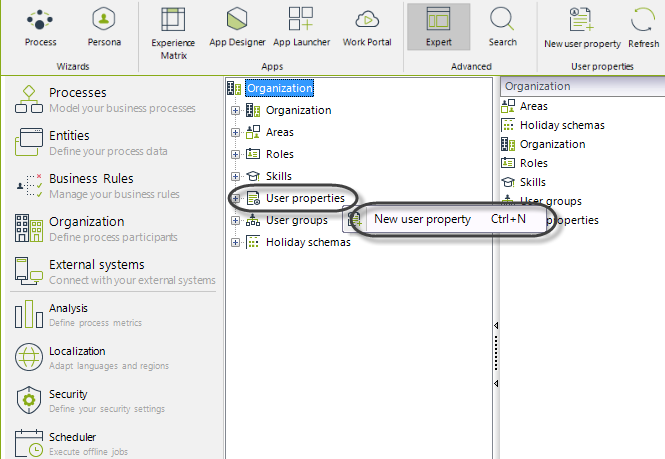Schemas
A schema defines the structure of attributes and metadata for one or more resource types. Here are the characteristics of the resources available in Bizagi SCIM services.
When you create a new user in Bizagi, you can set the user profile using several attributes.

These attributes are the basic information that Bizagi uses to create a User. The following User attributes can be defined using the User resource of the SCIM services:
•Full Name
•User Name
•Domain
•Contact Email
•Contact Cellphone
•Active
You can use one of the schema discovery services to obtain the JSON structure of this resources.
[Project_URL]/scim/v2/Schemas
This returns the schema for all resources. The following attributes of the User resource structure are available for user synchronization:
Bizagi User Attribute |
SCIM Attribute |
SCIM Type |
Description |
|---|---|---|---|
Full Name |
name : name.formatted |
string |
The user's full name is created according to the established name format. |
User Name |
userName |
string |
This attribute also includes the domain using this format userName@domain. All users must have a domain assigned. |
Active |
active |
Boolean |
Defines if the user is an active user in Bizagi |
Contact Email |
emails : value |
string |
Complete email address (i.e. userName@domain) |
emails : type |
string |
Only the work option is considered in Bizagi. |
|
emails : primary |
Boolean |
In Bizagi users only have one email, so this attribute must be set as true. |
|
Contact Cellphone |
phoneNumbers: value |
string |
Phone numbers must be in the format +CountryCode PhoneNumber, for example, +57 1234567890. Keep in mind it is necessary to have a space between the country/region code and the phone number. Its max length is 20 characters. |
phoneNumbers: type |
string |
Only the mobile option is considered in Bizagi. |
|
phoneNumbers: primary |
Boolean |
In Bizagi users only have one phone, so this attribute must be set as true. |
For each attribute you find a group of properties. For example the JSON response displays the following information:
{
"totalResults":2,
"itemsPerPage":10,
"startIndex":1,
"schemas":[
"urn:ietf:params:scim:api:messages:2.0:ListResponse"
],
"Resources":[
{
"id":"urn:ietf:params:scim:schemas:core:2.0:User",
"name":"User",
"description":"User Account",
"attributes":[
{
"name":"userName",
"type":"string",
"multiValued":false,
"description":"Unique identifier for the User, typically used by the user to directly authenticate to the service provider. Each User MUST include a non-empty userName value.This identifier MUST be unique across the service provider's entire set of Users. REQUIRED.",
"required":true,
"caseExact":false,
"mutability":"readWrite",
"returned":"default",
"uniqueness":"server"
}
]
}
]
}
Name structure
The object name depends on the set name format.
Considerations with emails and phones
the SCIM standard supports different types of emails and phone numbers. However, in Bizagi you can only store one email and one phone. When you are synchronizing users, consider the following:
For emails
•Only the Work type is considered.
•The Primary property must be always true.
•If you try to register more than one type of email in the JSON structure, only the first element is considered.
For phones
•Only the Mobile type is considered.
•The Primary property must be always true.
•If you try to register more than one type of phone in the JSON structure, only the first element is considered.
UserProperties
This resource is an extension of the User resource located under the same schema. When configuring new users in Bizagi, you can configure the simple type attributes shown in this SCIM resource in the User Configuration tab or the Additional Information tab if there are extended user properties:

The structure of this resource is the following:
Attribute |
Type |
Description |
|---|---|---|
DelegateEnable |
Boolean |
Use to activate the user delegated. |
enabledForAssignation |
Boolean |
Use to enable the user to receive assignments made by other users. |
createdCasesSkipAssigRules |
Boolean |
If this property is active, the case created by the user skips work allocation. |
offlineForms |
Boolean |
This attribute is not used in Bizagi. |
normalCost |
decimal |
This attribute is not used in Bizagi. |
overtimeCost |
decimal |
This attribute is not used in Bizagi. |
Similarly you find some characteristics for each attribute in the schema's JSON response, for example the DelegateEnable attribute it looks like this:
{
"id":"urn:ietf:params:scim:schemas:extension:bizagi:2.0:UserProperties",
"name":"BizagiUserProperties",
"description":"Bizagi user properties",
"attributes":[
{
"name":"DelegateEnabled",
"type":"boolean",
"multiValued":false,
"description":"Delegate Enabled",
"required":false,
"caseExact":false,
"mutability":"readWrite",
"returned":"default",
"uniqueness":"none"
}
]
}
New User Properties
|
Synchronization of User Properties is not available in Entra ID. |
Additionally, you can create customized properties to customize the profiles of your users. A new user property is created in the Organization module of the Expert view:

These new user properties are also displayed in the SCIM schema:
{
"id":"urn:ietf:params:scim:schemas:extension:bizagi:2.0:UserProperties",
"name":"BizagiUserProperties",
"description":"Bizagi user properties",
"attributes":[
{
"name":"Otherproperty",
"type":"integer",
"multiValued":false,
"description":"Other property",
"required":false,
"caseExact":false,
"mutability":"readWrite",
"returned":"default",
"uniqueness":"none"
}
]
}
|
Only simple data type properties, such as strings or integers, can be use to synchronize users through SCIM services. User properties configured as a relationship with entities in Bizagi cannot be used in user synchronization, and therefore are not displayed in the schemas. |
Last Updated 9/11/2024 10:24:54 AM